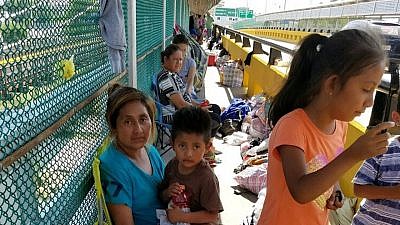As a general rule, injecting emotion into policy debates is a mistake. Cold, rational logic remains the best path to understanding an issue, and anything that undermines that process is usually bound to distort and polarize a conversation. And yet, sometimes emotion must not merely be taken into account, but become part of how we think and act about an issue. As the Trump administration is discovering this week, the discussion about the policy of separating children from parents who illegally cross the border into the United States is one such example.
Simply put, most Americans—conservative or liberal, Republican or Democrat—appear to find the consequences of enforcing a “zero tolerance” policy for illegals at the border to be intolerable. They think that not necessarily because they have analyzed how to fix the nation’s broken immigration system—a subject that deeply divides the country. Rather, there are just some things most of us aren’t willing to tolerate being done in our name, regardless of where we stand on the underlying issue.
Of course, the problem goes deeper than imagery. Being cruel to children, even if their parents have broken the law, is never the right thing to do. That is why the Jewish organizations weighing in against the practice of separating families isn’t limited to the usual liberal suspects, but also includes groups like the Orthodox Union and some evangelical figures, who might otherwise be expected to side with the administration.
The president’s partisans may deride the growing list of critics of the policy as weak sisters or willing tools of his liberal political opponents. Yet the White House’s attempt to blame it on Democrats—whom they rightly describe as being unwilling to compromise on legislation that would provide more border security—betrays their own lack of comfort with the position.
It’s true that many of those inveighing against this practice have partisan motivations. Others, like former CIA director Gen. Michael Hayden, have crossed the line into a different form of indecency by comparing Trump’s policy to the Holocaust with a tweet. It is a sad commentary on society when anger about Trump becomes so extreme that it’s impossible for growing numbers of Americans to disagree on such an emotional issue without talking about Nazis or alluding to the murder of Jews. No matter how sympathetic you may find those crossing illegally into the United States to be, their situation is not remotely analogous to that of an entire people marked for death, as the Jews of Europe were. Nor is it unreasonable for the United States to wish to control its border and enforce its laws by denying access to those who have not gained permission to enter.
Those who seek to provide “sanctuary” to illegals —saying they are motivated by Jewish ideas about social justice or claiming it to be a form of Holocaust remembrance —are not merely distorting Judaism and cheapening the memory of the Shoah. They are also taking a position that seems to hold that the United States isn’t entitled to set its own borders or to decide who may cross them.
Yet even if many of Trump’s critics are unfair or not being honest about their desire for open borders, it still doesn’t excuse a policy that is both needlessly cruel and making it harder to defend the rule of law. Nor does it excuse those of us who look to faith for guidance from saying that the practice of separating children from their parents in such instances must stop.
Even the soundest of policies must always be subjected to a moral, as well as a legal, test. Conservatives and people of faith who are otherwise deeply concerned about the government’s exercise of untrammeled power ought to be circumspect about something that gives the authorities the ability to take children away from parents in this fashion, even if the latter are breaking the law. Contrary to the claims of many on the left, it is reasonable for America to wish to deter illegal immigration. But it is never reasonable for it to behave with cruelty when other less draconian methods may be available to achieve the same purpose, such as those that would allow families to stay together without releasing them and thus flouting the law.
Conservatives believe that faith can and must be allowed a place on the public square, and that room for religious dissent against the popular culture of the day must be allowed. But that means we should also understand that even the rightful use of government power must be weighed against the harm that it may do when unchecked by basic standards of morality.
One doesn’t have to be a supporter of sanctuary or oppose toughening of security measures at the border to know that using children in this manner as hostages to deter illegal immigration is a mistake. Trump is a man who is always allergic to admitting fault. But whether he does so or not in this case is irrelevant as long as he ends a practice that harms innocents.
























